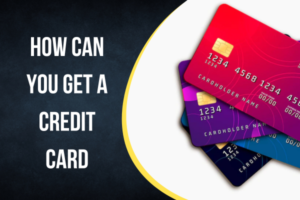Why Credit Card Application Declined

Why Credit Card Application Declined
If your credit card application has been declined, it can be disappointing and frustrating. However, it’s important to understand the reasons why your application was declined and what you can do to improve your chances of approval in the future. Here are some steps you can take:
Find out why your application was declined: Creditors are required to provide you with the reason why your application was declined. Review the reason provided to understand why your application was declined.
Check your credit report: Obtain a copy of your credit report from one of the credit reporting bureaus and review it for errors or inaccuracies. If you find any, dispute them with the bureau.
Improve your credit score: If your credit score is low, work on improving it by paying down debts, making payments on time, and avoiding opening new lines of credit.
Apply for a different card: Consider applying for a different credit card with less stringent eligibility criteria or a lower credit score requirement.
Consider alternative options: If you can’t qualify for traditional credit cards, consider alternative options, such as a secured credit card or a credit-builder loan.
Apply with a co-signer: If you have a friend or family member with a good credit history, you may be able to apply for credit with them as a co-signer.
Remember that every credit application is different, and it’s important to understand why your application was declined before taking any action. If you’re still unsure what steps to take, consider consulting with a financial advisor or credit counselor for personalized advice.
Why Was My Credit Card Application Declined?
As an AI language model, I don’t have access to your specific credit card application or the information that the credit card company used to make their decision. However, I can give you some general reasons why credit card applications may be declined:
Poor credit history: Credit card companies use credit scores to evaluate an applicant’s creditworthiness. If your credit score is low, or if you have a history of late payments or defaults, the credit card company may view you as high risk and decline your application.
Insufficient income: Credit card companies may require a minimum income to qualify for a credit card. If your income does not meet their requirements, your application may be declined.
Too much debt: If you have a high amount of debt or a high debt-to-income ratio, the credit card company may view you as a high risk and decline your application.
Errors on the application: If you made errors on your credit card application, such as providing incorrect personal information or employment history, the credit card company may decline your application.
Suspicious activity: Credit card companies may flag certain activity on your credit report as suspicious, such as opening multiple credit card accounts in a short period of time, which could lead to a declined application.
It’s important to note that credit card companies have their own unique criteria and approval processes, so even if you meet the general requirements, there may be other factors at play that led to your application being declined. If your application was declined, you may want to contact the credit card company directly to find out why and see if there is anything you can do to improve your chances of approval in the future.
Why Am I Not Allowed to Apply for a Credit Card?
As an AI language model, I don’t have access to your personal information and specific circumstances, so it’s difficult to say why you may not be allowed to apply for a credit card. However, here are some common reasons why you may be ineligible to apply for a credit card:
You are under the age of 18: In most countries, you must be at least 18 years old to apply for a credit card.
You don’t have a credit history: If you have never had a credit card or taken out a loan, you may not have a credit history. Without a credit history, credit card companies may view you as a higher risk and may not approve your application.
You have a poor credit history: If you have a history of late payments, defaults, or other negative marks on your credit report, credit card companies may view you as a high risk and may not approve your application.
You don’t have a stable income: Credit card companies typically require that you have a stable source of income to qualify for a credit card. If you don’t have a steady income or are currently unemployed, you may not be eligible to apply.
You have too much debt: If you have a high amount of debt or a high debt-to-income ratio, credit card companies may view you as a high risk and may not approve your application.
You have recently filed for bankruptcy: If you have recently filed for bankruptcy, you may not be eligible to apply for a credit card until your bankruptcy has been discharged.
It’s important to remember that credit card companies have their own unique criteria for approving applications, and even if you meet the basic eligibility requirements, there may be other factors at play that led to your ineligibility. If you are unsure why you are not eligible to apply for a credit card, you may want to contact the credit card company directly to inquire about their specific requirements and policies.
Why Do Credit Applications Get Declined?
Credit applications may get declined for various reasons, including:
Poor credit history: One of the most common reasons why credit applications get declined is a poor credit history. This includes late payments, defaults, collections, and bankruptcy, which can negatively impact your credit score and make you appear risky to lenders.
Insufficient income: Creditors may decline your application if they determine that your income is not sufficient to make payments on the credit that you’re applying for. They want to ensure that you have the ability to repay the credit that they extend to you.
High credit utilization: Your credit utilization rate refers to the percentage of available credit that you’re currently using. If you have a high credit utilization rate, creditors may consider you a high-risk borrower and decline your application.
Errors on the application: Sometimes, errors or omissions on the application can lead to an automatic decline. For example, if you provide incorrect personal information or employment details, it can trigger a red flag and lead to your application being declined.
Too many inquiries: When you apply for credit, it generates a hard inquiry on your credit report. If you apply for multiple lines of credit in a short period of time, it can raise red flags with creditors and lead to a decline.
Lack of credit history: If you have never had a credit card or borrowed money in the past, you may not have enough credit history to demonstrate that you’re a responsible borrower. Without a credit history, creditors may decline your application because they have no way to gauge your creditworthiness.
It’s important to note that each creditor has its own criteria for approving credit applications, and what may be a reason for a decline with one creditor may not necessarily apply to another creditor. If your application is declined, it’s important to ask for feedback from the creditor and to work on improving your credit history before reapplying.
What Can You Do If Your Credit Application Is Denied?
If your credit application is denied, there are several steps you can take:
Review the reason for denial: Creditors are required by law to provide you with the reason why your credit application was denied. Review the reason provided to determine why your application was declined.
Check your credit report: Obtain a copy of your credit report from one of the credit reporting bureaus and review it for errors or inaccuracies. If you find any, dispute them with the bureau.
Improve your credit score: If your credit score is low, work on improving it by paying down debts, making payments on time, and avoiding opening new lines of credit.
Consider alternative options: If you can’t qualify for traditional credit cards, consider alternative options, such as a secured credit card or a credit-builder loan.
Apply with a co-signer: If you have a friend or family member with a good credit history, you may be able to apply for credit with them as a co-signer.
Wait and try again later: If your credit application is denied, it’s best to wait at least three to six months before applying again to avoid multiple hard inquiries on your credit report.
Remember that every credit application is different, and it’s important to understand why your application was denied before taking any action. If you’re still unsure what steps to take, consider consulting with a financial advisor or credit counselor for personalized advice.
What Is the Eligibility to Apply for Credit Card?
The eligibility criteria for applying for a credit card can vary depending on the issuer, but here are some common requirements:
Age: In most countries, you must be at least 18 years old to apply for a credit card.
Income: You must have a minimum income to qualify for a credit card. The specific income requirements vary depending on the issuer and the type of card.
Credit score: Creditors will consider your credit score when determining your eligibility for a credit card. A higher credit score generally improves your chances of approval.
Employment status: Most issuers will require that you have a stable source of income, such as a job, to qualify for a credit card.
Residency status: Some issuers may require that you be a permanent resident or citizen of the country where you’re applying for a credit card.
Debt-to-income ratio: Creditors may look at your debt-to-income ratio to determine your eligibility for a credit card. This ratio is calculated by dividing your total debt by your total income.
It’s important to note that each creditor has its own eligibility requirements for credit card applicants, and meeting the above requirements does not guarantee approval. Additionally, some credit cards may have additional requirements or restrictions, such as requiring a certain credit score or income level to qualify.
Can a Normal Person Apply for a Credit Card?
Yes, a normal person can apply for a credit card as long as they meet the eligibility requirements set by the issuer. Credit cards are typically available to anyone who is at least 18 years old, has a source of income, and has a good credit score.
However, it’s important to remember that credit cards should be used responsibly and not as a way to overspend or accumulate debt. It’s important to understand the terms and conditions of the credit card, including interest rates, fees, and rewards, before applying. You should also have the plan to pay off your balance in full each month or to make payments on time to avoid interest charges and late fees.


